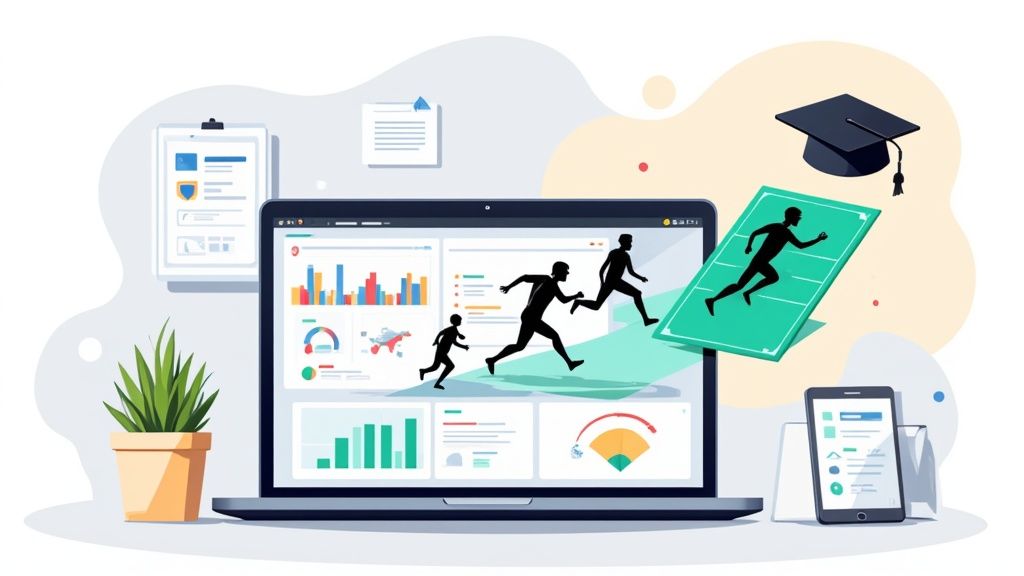
Your Guide to Online Sports Analytics Degrees
So, what exactly is an online sports analytics degree? Think of it as a specialized program that teaches you how to use data to make smarter, faster decisions across the entire sports world. It’s a perfect blend of statistics, business smarts, and deep sports knowledge, all designed to get you ready for a career where your love of the game meets the power of numbers.
Unlocking the Modern Sports Playbook
Ever wonder how a team really decides which player to draft? Or how they land on the exact right number for a massive contract? What about setting ticket prices that fill the stadium without alienating fans? These days, it's rarely just gut instinct.
Those huge decisions are powered by data, and an online sports analytics degree is your ticket to being the person behind those insights.
This is the modern playbook for the sports industry. These programs are built for a whole range of people. Maybe you're looking to switch careers and finally break into sports. Or perhaps you're already in the industry and want to add some serious quantitative skills to your resume. Even recent grads with a knack for math or business will find a direct path to apply what they know in a field that's anything but boring.
Who Is This Degree For?
An online sports analytics degree is a fantastic fit if you're one of these people:
- The Passionate Fan: You don't just watch the game, you analyze it. You're fascinated by the hidden strategies and want to turn that passion into a real career.
- The Data Enthusiast: You genuinely enjoy digging into numbers and finding the stories they tell. The idea of building a model to predict player performance gets you excited.
- The Career Changer: You're stuck in another field but dream of working in sports. An online degree gives you the focused education you need to make that leap without quitting your day job.
- The Industry Pro: You're already working in sports, maybe in marketing, coaching, or management, and you know that upskilling in data is the key to advancing.
If any of these sound like you, it's worth taking a look at the kinds of jobs that are actually out there. A quick browse through current openings at www.sportsjobs.online can give you a real sense of what teams and companies are looking for.
What Will You Actually Learn?
These programs are all about giving you practical skills you can use from day one. You’ll move past simply watching the game and learn how to truly analyze it.
It's wild to think that just a decade ago, this stuff was a tiny footnote in broader business degrees. But with the global sports industry now worth over $500 billion, the demand for data experts has exploded. The number of online sports analytics programs has shot up by more than 60% since 2020, and the demand for professionals is projected to grow another 27% in the next five years. You can learn more about the rapid growth of sports analytics education and see just how fast this field is moving.
At its core, an online sports analytics degree teaches you how to ask the right questions and use data to find the answers. It’s about transforming raw numbers into a competitive advantage, whether that's on the field, in the front office, or in the broadcast booth.
To give you a clearer picture, here’s a breakdown of the essential ingredients you'll find in almost any solid online sports analytics degree.
Key Components of a Typical Online Sports Analytics Degree
| Component | Description |
|---|---|
| Data Analysis & Statistics | The absolute foundation. You'll learn to apply statistical methods to make sense of sports data, spot meaningful trends, and test theories. |
| Predictive Modeling | This is where you learn to build models that can forecast things like player performance, game outcomes, or even ticket sales. It's about giving your organization a peek into the future. |
| Data Visualization | You’ll get hands-on with tools like Tableau to turn complex data into charts and dashboards that a coach or GM can actually understand and use. |
| Sports Business Principles | You'll study the money side of sports, including finance, marketing, and management, to see how analytics directly drives revenue and smarter operations. |
| Programming Languages | Most programs will teach you R or Python, the two go-to languages for data pros to clean, manage, and analyze massive datasets. |
| Ethical Considerations | A crucial piece of the puzzle. This covers the responsible use of data, from protecting player privacy to maintaining the integrity of the competition. |
Ultimately, these components work together to give you a complete toolkit. You won't just be a stats person, you'll be a sports professional who can speak the language of data and translate it into winning strategies.
Core Courses and Specializations You Will Study
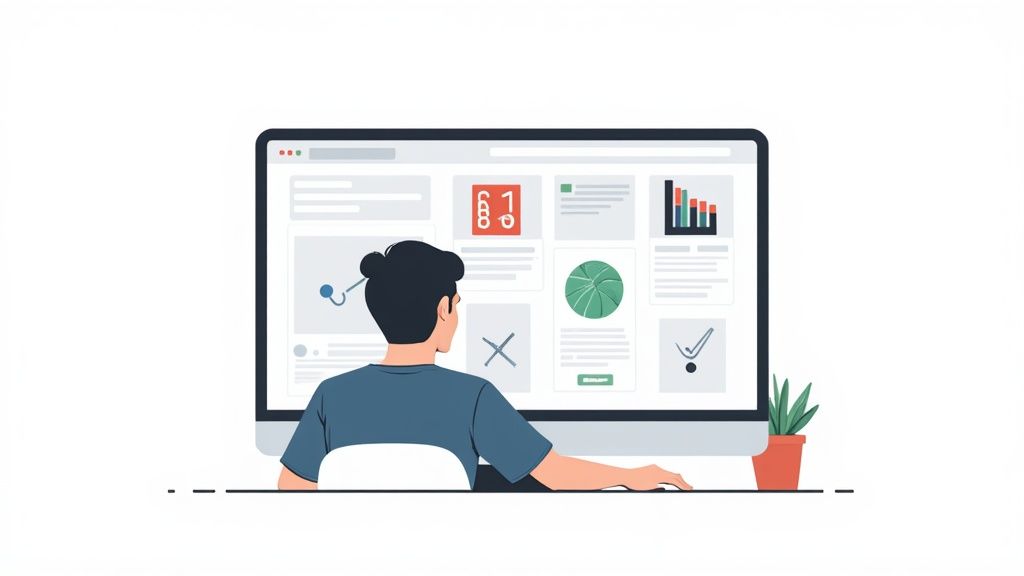 Jumping into an online sports analytics degree is a lot like an athlete’s training regimen. First, you have to master the fundamentals, the basic drills that build a solid foundation. Only then can you start specializing in a specific role on the field.
Jumping into an online sports analytics degree is a lot like an athlete’s training regimen. First, you have to master the fundamentals, the basic drills that build a solid foundation. Only then can you start specializing in a specific role on the field.
The curriculum in these programs works the same way. You'll start with the core skills everyone needs, then get the chance to chase what you're truly passionate about.
The Foundational Training Ground
Think of the core courses as your boot camp. They're designed to give you the universal tools every single data pro needs, whether they end up working for a Premier League club or a fantasy sports startup. These classes make sure you speak the language of data fluently.
Most programs build their curriculum on a few non-negotiable pillars. This is where you'll spend a good chunk of your time, getting your hands dirty with the technical skills needed to handle messy, complex sports data.
Here’s what you can almost always expect to see on the syllabus:
- Statistical Methods in Sports: This is where you learn to see beyond the box score. Forget simple batting averages, you’ll be diving into probability, regression analysis, and hypothesis testing to find the patterns that actually win games.
- Programming for Sports Analytics: Time to get your hands on the real tools of the trade. You'll work with languages like R or Python, which are the industry standards for cleaning, crunching, and visualizing massive datasets, everything from player-tracking data to fan engagement metrics.
- Database Management: Teams and leagues are sitting on mountains of data. This course teaches you how to build and query databases, usually with SQL, so you can pull the exact piece of information you need, right when you need it.
- Sports Business Operations: Your analysis is useless if it doesn't solve a real-world problem. This class gives you the business context, the financials, marketing, and management side, that turns your data insights into actionable advice for the front office.
Once you’ve got these skills down, you'll be ready for the kind of thinking that gets you hired. To find a job in the sports industry, you can visit www.sportsjobs.online to see how these exact skills line up with what teams are looking for right now.
Mastering Your Position with Specializations
After you've built that solid foundation, it's time for the fun part: choosing where you want to make your mark. Specializations let you go deep into a specific niche, aligning your education directly with your dream job.
It’s your chance to become the go-to expert for a specific area of strategy, just like a team's dedicated set-piece coach or scouting guru.
The real value of an online sports analytics degree often comes from its hands-on nature. Programs use real sports datasets and project-based assignments, so you're not just learning theory, you're actively building a portfolio of work that proves your skills to future employers.
A few common specializations you’ll run into:
- Player Performance and Scouting: This is the classic "Moneyball" track. You’ll use data to spot undervalued players, project future performance, and help GMs build a championship roster.
- Sports Betting and Fantasy Sports Analytics: With the explosion in legalized gambling, this is a red-hot field. You’ll learn to build predictive models to find an edge against the sportsbooks or dominate your daily fantasy league.
- Fan Engagement and Marketing Analytics: This is all about the business side of the game. You'll analyze ticket sales, social media trends, and fan behavior to help teams grow their fanbase and boost revenue.
These specializations are what turn you from a data generalist into a true sports analytics expert. By the time you graduate, you'll have a portfolio of projects that mimic the real-world challenges you'll face on the job, proving you know how to solve the problems that keep front offices up at night.
Top Universities Offering Online Sports Analytics Degrees
Choosing the right university is a huge decision. With so many online sports analytics degrees popping up, it’s easy to feel overwhelmed and unsure where to even begin.
Here's the thing: not all programs are created equal. Some schools have deep-rooted connections with pro leagues, which can open doors to incredible networking opportunities. Others might be laser-focused on a specific niche, like sports betting analytics, with faculty who are genuine leaders in that space.
You have to look past the school's big name and dig into what makes each program tick. What’s the faculty’s real-world industry experience? What tech and software will you actually get your hands on? Do they have partnerships with real sports organizations? These are the things that will shape your education and career far more than a generic college ranking.
Finding Your Fit in the Field
The best program for you is the one that lines up with your career goals. Simple as that.
If you dream of working in a team’s front office, a program heavy on scouting and player evaluation is probably your best bet. If you're more drawn to the business side, look for programs that emphasize marketing analytics and fan engagement.
Remember, the degree is just the first step. The real goal is landing a job where you can put your skills to work. A great move is to check out what kinds of jobs are actually out there while you research schools. Peeking at listings on sites like www.sportsjobs.online gives you a ton of clarity on what employers want, helping you pick a program that teaches those exact skills.
A Look at Typical Admissions Standards
While every university has its own checklist, most online sports analytics degrees share some common entry requirements. Knowing what to expect ahead of time can help you build a much stronger application.
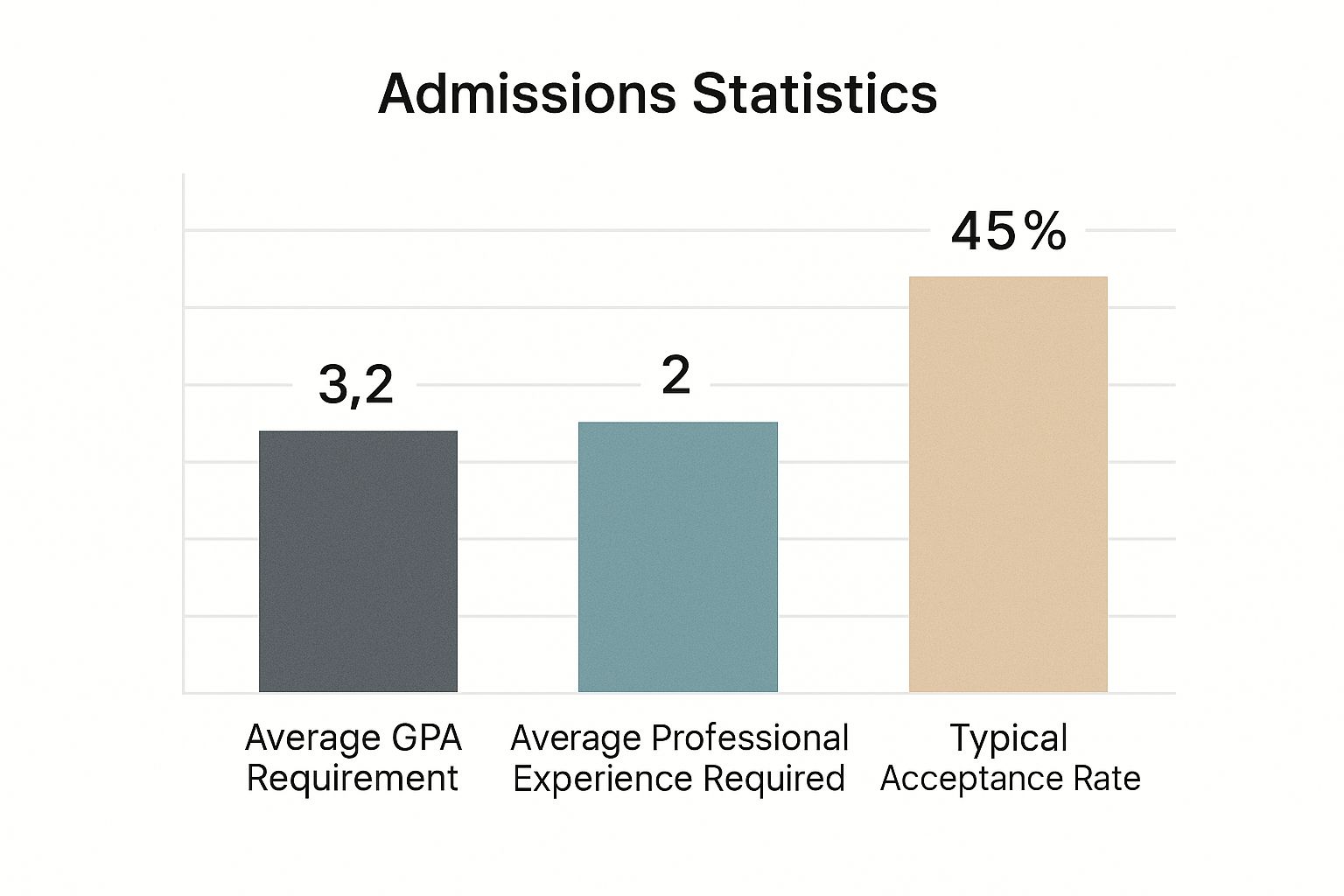
As you can see, these programs are competitive but definitely accessible. They often value professional experience right alongside academic achievements. Plenty of successful applicants use their work history to balance out a less-than-perfect GPA, showing a practical understanding that’s pure gold in the sports industry.
This flexible mindset is a big reason these programs have exploded in popularity. Enrollment has more than doubled since 2020, with over 5,000 students now enrolled globally. This boom lines up perfectly with a 35% jump in job postings for sports analytics roles.
Institutions like Southern New Hampshire University and Maryville University offer fully online formats, attracting working professionals from over 60 countries who can level up their skills without having to relocate.
One of the biggest misconceptions is that you need to be a math genius or a coding whiz to get in. Many programs are actually designed to build these skills from the ground up, making them perfect for career changers coming from business, communications, or even coaching. All you really need is a genuine curiosity and a drive to apply quantitative thinking to the games you love.
Comparison of Top Online Sports Analytics Programs
To give you a side-by-side look at what’s out there, I’ve put together a quick comparison of some leading online sports analytics degrees. This table should help you compare key features and find the best fit for what you're looking for.
| University | Program Name | Credit Hours | Key Focus Areas |
|---|---|---|---|
| Northwestern University | Master of Science in Sports Analytics | 11 Courses | Predictive analytics, data visualization, sports business strategy, and leadership. |
| University of Mississippi | Master of Science in Sport Analytics | 36 | Sport performance, business analytics, research methods, and a required internship or thesis. |
| Maryville University | Master of Science in Data Analytics - Sports Analytics | 30 | Machine learning, data mining, fan behavior analysis, and player performance metrics. |
| Southern New Hampshire University | MBA in Sport Management - Athletic Administration | 30 | Financial management, sports marketing, and organizational leadership with data-driven decision-making. |
This table really highlights the variety. Some programs are deeply technical and all about machine learning, while others blend analytics with classic business and management skills. The right choice completely depends on where you want to take your career.
For example, if you're aiming for a role like this Data Analyst - MLS position, a program with a heavy focus on data mining and performance metrics would be a fantastic choice.
How To Prepare Your Application
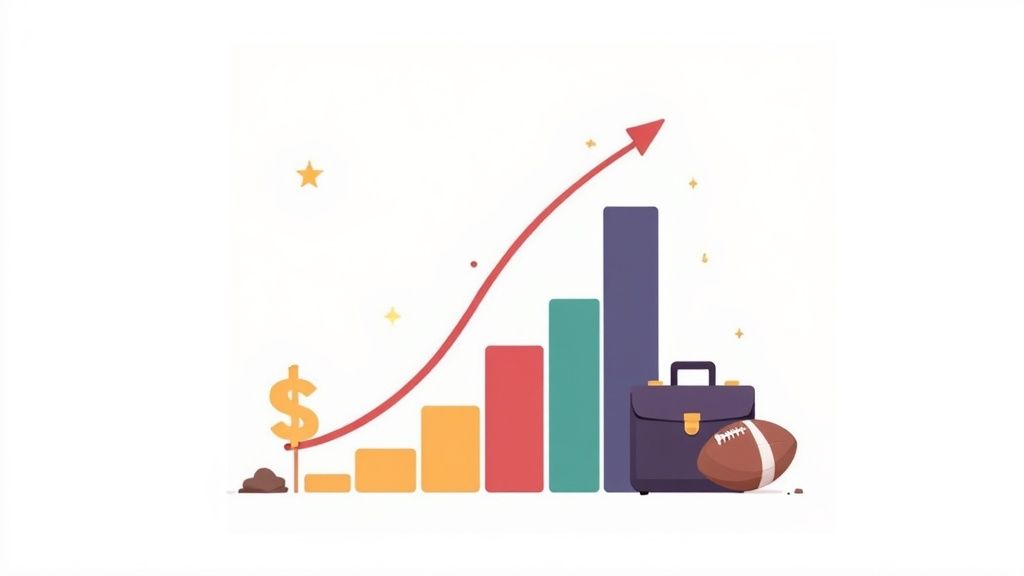 Applying for an online sports analytics degree can feel like game day. But with the right prep, you can put together an application that really stands out.
Applying for an online sports analytics degree can feel like game day. But with the right prep, you can put together an application that really stands out.
The process is pretty straightforward once you understand what admissions committees are actually looking for. They want to see your potential, a genuine passion for the world of sports, and your ability to handle the numbers-driven coursework.
Think of your application as your personal highlight reel. Every single piece, from your transcripts to your personal essay, is a chance to show them why you belong in their program. It's less about being the "perfect" candidate and more about proving you're committed and ready to succeed in this exciting field.
Breaking Down the Application Checklist
Most programs ask for a similar set of materials. My advice? Get these documents organized early. It makes the entire process so much smoother.
Here are the core components you’ll almost certainly need to pull together:
- Academic Transcripts: Universities need to see your undergraduate coursework and GPA. A high GPA is great, but honestly, many programs look just as closely at how you did in any math, statistics, or business-related classes.
- Letters of Recommendation: These are crucial. Ask professors or bosses who can speak directly to your work ethic, your analytical mind, and your character. Give them plenty of notice and make their lives easier by providing your resume and a draft of your personal statement.
- Statement of Purpose: This is your shot to tell your story. It’s a short essay where you connect your past experiences, your love for sports analytics, and what you want to do with your career.
- Resume or CV: Lay out your professional experience, but make sure to highlight any projects or responsibilities that involved data, analysis, or the sports industry.
Crafting a Standout Application
Just checking off the boxes isn't enough. You need to make your application memorable. The key is to show, not just tell, the admissions committee why you’re a great fit. They read hundreds of these, so you have to connect the dots for them.
Focus on showcasing your quantitative skills. Did you manage a budget in a past job? Analyze sales data? Run a project with measurable results? Highlight those experiences. Even small, self-taught projects, like building a simple predictive model for your favorite team, can make a huge impression.
If you're serious about this path, start looking at job descriptions for roles like a Senior Data Analyst to see the kind of skills you'll eventually need. It gives you a target to aim for.
Your statement of purpose is where you bring it all together. Don't just say you love sports. Explain why you are drawn to the analytical side and how this specific online sports analytics degree will help you achieve a clear career objective.
What If You Don't Meet Every Requirement?
It’s pretty common to feel like your application has a weak spot. Maybe your GPA isn't what you'd like, or you don't have formal stats experience. Don't let that stop you.
If your quantitative background is a little light, think about taking a "bridge" course. Enrolling in an online statistics or Python course on a platform like Coursera or edX before you apply shows incredible initiative.
Gaining relevant work experience can also seriously strengthen your profile. Even volunteering for a local team can give you fantastic material for your essay and show you're serious. It’s all about demonstrating your commitment.
Career Paths and Job Outlook in Sports Analytics
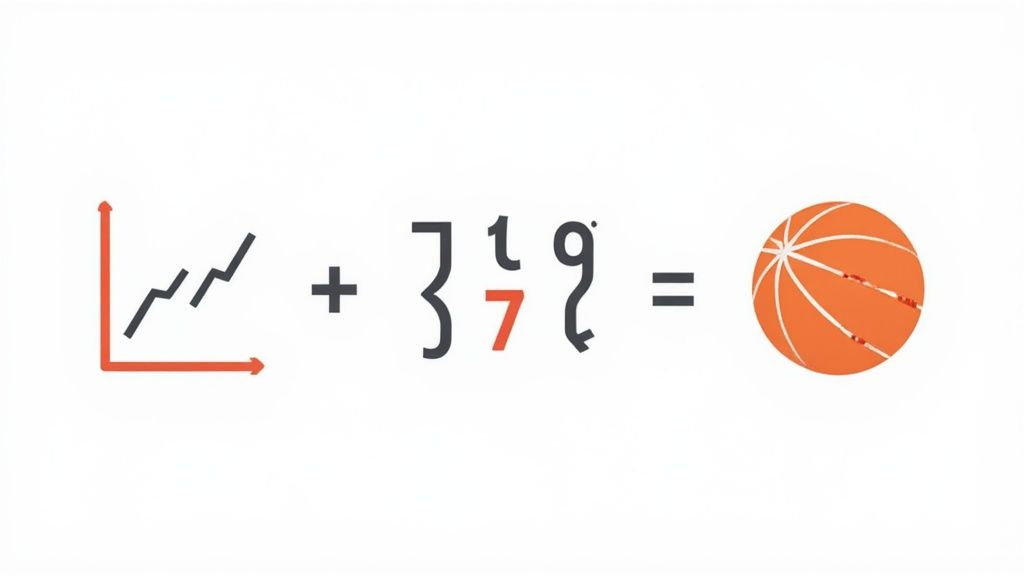
So you've earned an online sports analytics degree. What's next? You can become a new kind of power player in the sports world. Your currency is data, and you'll use it to shape everything from clutch in-game plays to big-money front-office decisions.
The industry is hungry for people with these skills. Teams, leagues, and sports-adjacent companies are all scrambling to find experts who can turn raw numbers into a genuine competitive edge. This degree is your ticket to that world.
If you're curious what that looks like in the real world, take a peek at the current jobs posted on www.sportsjobs.online. It’s the clearest way to see the direct line from this education to an actual career.
A Day in the Life of a Sports Analyst
What does a sports analyst actually do all day? It's a blend of deep thinking, technical wizardry, and, most importantly, clear communication. Let's pull back the curtain on a few common roles.
Player Performance Analyst
Picture this: you work for a pro basketball team. Your day kicks off by diving into the player tracking data from last night’s game. You’re not just looking at points and rebounds, you're identifying which defensive rotations shut down the opponent's star player and which offensive sets generated the best looks.
By the afternoon, you've built a clean, visual dashboard for the coaching staff. It pinpoints exactly where the team is excelling and where they’re falling short. Your analysis directly informs that day's practice, helping the team patch up weaknesses before the next game. The impact is immediate.
Sports Data Scientist
As a data scientist for a football franchise, you’re playing the long game. Instead of one game, you might spend weeks building a predictive model to forecast a college quarterback's shot at succeeding in the pros.
You’re using machine learning to juggle hundreds of variables, everything from completion percentage under pressure to 40-yard dash times. Your model becomes an essential tool for the scouting department come draft day, helping them dodge expensive busts and unearth hidden gems.
The real job in both these roles is storytelling with numbers. You're not just a number-cruncher. You're crafting a narrative that gives coaches, GMs, and executives the confidence to make smarter, evidence-backed decisions.
Expanding Roles Across the Industry
The demand for data pros isn’t just limited to the teams themselves. The entire sports ecosystem, from media to betting to marketing, is now built on a foundation of analytics. This opens up a surprisingly diverse set of career paths.
Here are just a few other doors that open with a sports analytics degree:
- Data-Driven Scouting Coordinator: You’ll work alongside traditional scouts, but your superpower is quantitative analysis. You use data to spot undervalued players in the transfer market or find prospects who are a perfect statistical match for a team’s tactical system.
- Sports Marketing Analyst: Your focus is the fans. By analyzing ticket sales, social media chatter, and survey data, you help the front office figure out everything from ticket pricing to which promotions will fill the stands.
- Sports Betting Analyst: Working for a sportsbook or a media outlet, you'll develop the sophisticated models that set game odds and predict outcomes. It’s a high-stakes role that demands a serious grasp of probability and statistics.
- Sports Technology Roles: All this data has to live somewhere. The industry needs technical experts to manage the databases, networks, and systems that make analytics possible. A role like a Junior Network Engineer is a crucial part of the machine that keeps the data flowing.
Salary and Job Growth Projections
The job outlook in sports analytics is incredibly strong. It’s a field that’s still young and growing fast, which means more opportunities and less saturation than in older, more established industries.
Salaries can swing quite a bit depending on the league, the team's budget, and your experience, but the financial upside is clear.
- Entry-Level Analysts: Typically start in the $55,000 to $75,000 range.
- Mid-Level Data Scientists: After a few years in the game, salaries often climb to between $80,000 and $120,000.
- Senior/Director Roles: The top dogs, directors of analytics and lead data scientists in major pro leagues, can command salaries well over $150,000.
It's not just about the money, though. It’s about the sheer number of jobs. A decade ago, having a dedicated analytics department was a luxury. Today, it’s a necessity. That explosive growth means more doors are opening at every level, making a sports analytics degree a seriously smart play for your future.
Is an Online Sports Analytics Degree Worth It?
After diving into the courses, careers, and top schools, it all boils down to one simple, very personal question: is it worth it for you?
An online sports analytics degree is a serious investment. We're talking real time and real money. But it’s also one of the most direct paths into a field that's exploding in growth and completely reshaping the sports we love.
The call you have to make is all about weighing the obvious benefits against some very real challenges. You need to take an honest look at your career goals, how comfortable you are with crunching numbers, and what your financial picture looks like. This isn't about chasing a trend, it's about finding the right fit for your future.
The upsides are pretty clear. The flexibility of online learning is a massive advantage, letting you fit school around a job or other parts of your life. You're also stepping into a field where demand for your skills is skyrocketing. Teams, leagues, and sports media companies are all hungry for people who can turn data into wins.
A Quick Self-Assessment Framework
To help you figure this out, take a minute to think through these key questions. Answering them honestly will give you a much clearer idea of whether this path really lines up with what you want.
- Your Career Ambitions: Where do you honestly see yourself in five years? Are you gunning for a front-office role with a team, a hardcore data science position, or maybe something in the sports business world? Having a clear target makes it way easier to see if a degree's curriculum will get you there.
- Your Learning Style: Can you really be your own boss? Online programs demand a lot of self-motivation and discipline to stay on top of lectures, projects, and deadlines without a professor physically looking over your shoulder.
- Your Financial Picture: Can you comfortably swing the tuition? The potential return on investment is huge, but you absolutely need a solid financial plan before you hit that "enroll" button.
- Your Passion for Data: Do you actually like digging into numbers and finding the stories hidden inside? This stuff is heavily quantitative. A genuine interest in data is non-negotiable for sticking with it and actually enjoying your future job.
Ready to see what kind of doors this could open? It's worth exploring the live job postings on www.sportsjobs.online to get a real, tangible feel for the careers waiting for you.
Balancing the Pros and Cons
Let's be realistic. While the career outlook is fantastic, the academic journey is tough. The quantitative coursework can be a real grind, especially if you don't already have a strong footing in statistics or programming.
The decision really comes down to this: An online sports analytics degree is absolutely worth it if you have a true passion for both sports and data, a clear career goal in mind, and the discipline to handle a challenging, numbers-heavy curriculum. For the right person, it's an investment that pays off big time.
When you look back at the key benefits, like the high industry demand and the freedom to learn from anywhere, it paints a pretty exciting picture. But you have to put that right next to the challenges, like the rigorous coursework. By weighing both sides carefully, you can make a choice you feel good about and move forward with confidence, knowing exactly what it takes to succeed in this incredible field.
Of course. Here is the rewritten section, adopting the expert, human-like voice from the provided examples.
Your Questions, Answered
Jumping into a sports analytics degree brings up a lot of questions. It’s a big decision. Let's tackle some of the most common ones I hear so you can move forward with confidence.
Do I Need to Be a Math Whiz to Succeed?
Not necessarily, but you do need to be ready to work with numbers. While a strong math background is a plus, it's not always a deal-breaker. Many programs are built for people coming from all sorts of backgrounds.
They usually start with foundational courses in stats and programming to get everyone on the same page. The most important thing is a real willingness to dig into quantitative subjects. If you're still on the fence, try an introductory online course in statistics or Python before applying. It's a great way to test the waters, build some confidence, and make your application even stronger.
How Do You Get Hands-On Experience in an Online Program?
This is a big one, but top online programs have it figured out. They build practical, hands-on work right into the curriculum. You’ll get your hands on the same kind of real-world sports datasets that the pros use, often sourced from industry partners.
The coursework isn't just theory. It's project-based. You’ll be analyzing this data to solve actual problems, like scouting player performance or building models to predict game outcomes. Most programs wrap up with a final capstone project where you do a deep-dive analysis, which is basically a trial run for the work you'd do in a real analytics role.
Once you’ve built up that project portfolio, you’ll be ready to hit the job market. You can see the kinds of roles that are open right now by checking out the latest openings on www.sportsjobs.online.
Are Online Sports Analytics Degrees Actually Respected by Teams and Companies?
Yes, absolutely, as long as the degree comes from an accredited, reputable university. The sports industry is incredibly results-driven. What employers really care about is whether you can work with data to find insights that give them a competitive edge.
The best online programs offer the same tough curriculum as their on-campus counterparts. At the end of the day, employers are focused on your skills, your project portfolio, and your understanding of the sports business. A quality online degree delivers on all three, and a strong portfolio is the ultimate proof that you can do the job.
Ready to turn your passion into a profession? Sportsjobs Online is your go-to resource for finding jobs in sports analytics and technology. Explore opportunities with top teams and companies at https://www.sportsjobs.online.
Hundreds of jobs are waiting for you!
Subscribe to membership and unlock all jobs
Sports Analytics
We scan all major sports and leagues
Updated Daily
New jobs are added every day as companies post them
Refined Search
Use filters like skill, location, etc to narrow results
Alerts
You can get daily alerts in your email for a specific search
Access to job postings from top teams and companies
Daily updates and notifications based on your preferences
🎯 Over 90% of customers chose to renew their subscriptions after the initial sign-up
Monthly
$6.99
per month
✓ Flexible monthly billing
✓ Unlimited access to all jobs
✓ Advanced filtering tools
✓ Daily job alerts
✓ Exclusive discount codes
✓ Cancel anytime
BEST VALUE
Yearly
$39
per year • Only $3.25/mo
✓ Save 50% vs monthly
✓ Unlimited access to all jobs
✓ Advanced filtering tools
✓ Daily job alerts
✓ Exclusive discount codes
✓ Cancel anytime
Lifetime
$59
one-time • forever
✓ Pay once, access forever
✓ Unlimited access to all jobs
✓ Advanced filtering tools
✓ Daily job alerts
✓ Exclusive discount codes
✓ Best long-term value